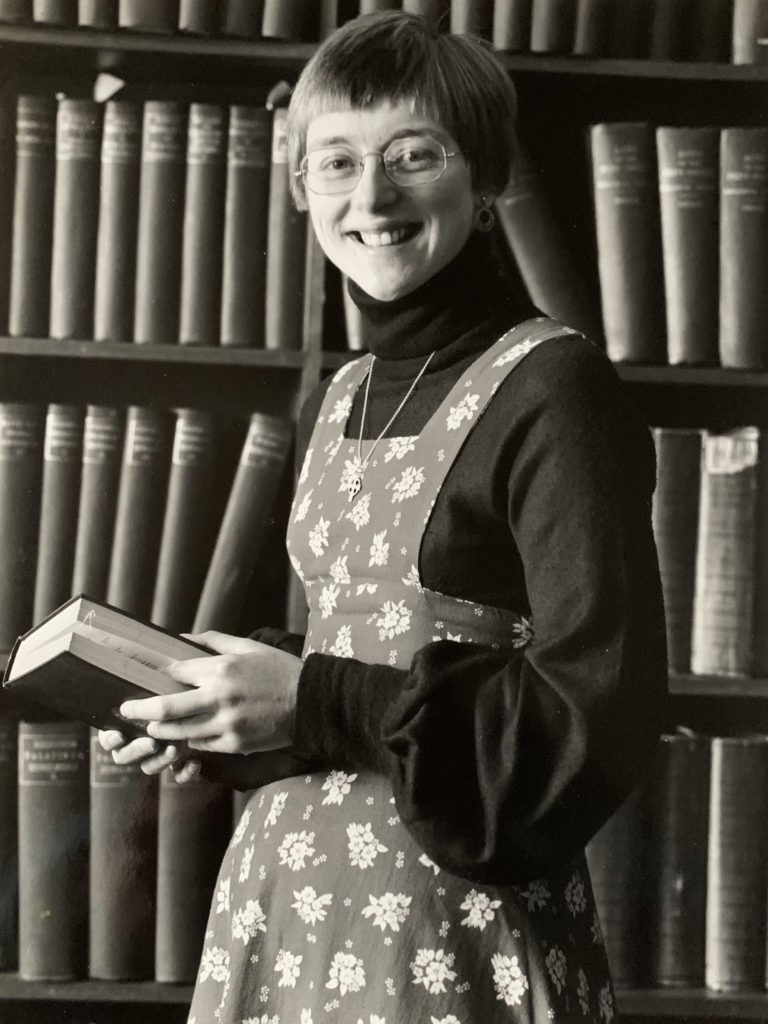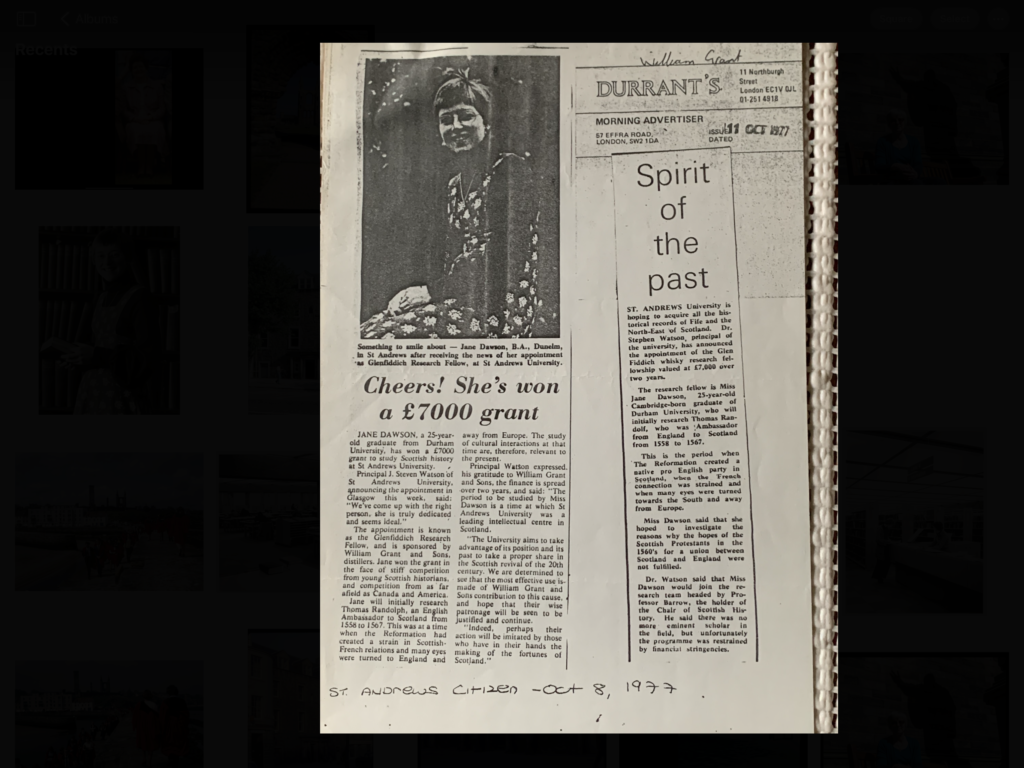Jane Dawson
Jane Dawson arrived at the University of St Andrews in 1977, and she remembers that her arrival caused something of a stir. Not only was she the first Glenfiddich Fellow in Scottish History, set up through money donated by William Grant and Sons, the makers of Glenfiddich whisky, but she was English, she hadn’t done a Scottish history degree, and she was a woman.
‘It was that age-old joke, I was a woman and a Fellow!’, she remembers.
Jane recalls that the Fellowship was as much of a learning curve for the university as it was for Jane herself, as Research Fellows in were not common in universities at that time (outside of ‘Oxbridge’) and there were few people in full-time postdoctoral positions.

‘And as the very first Glenfiddich Research Fellow, nobody quite knew what that particular job meant. My tenure was only two years, whereas subsequent Glenfiddich Fellows were all three, and that was just because everybody was trying to work out what was going on.’
Jane had come to St Andrews having completed both her BA and her PhD in History at the University of Durham, and quickly had to learn the intricacies of the sub honours system and come to terms with the peculiarities of life in this small seaside town.
Her interest in history had to some extent been influenced by her cousin’s career as a history teacher, and she also had an elder sister who read history at the University of Edinburgh. Her father had degrees in both civil engineering and theology, and so Jane’s progression from an academically-oriented girls’ school to a university education was seen as a natural choice.
Although Scottish History was not yet a department of its own but technically within Modern History, and therefore based at St Katharine’s Lodge, Jane had a room in St John’s House, meaning that she was also able to get to know colleagues in Mediaeval and Ecclesiastical History. During the Fellowship, Jane was formally responsible to the Professor of Modern History Norman Gash but worked closely with the Scottish History Professors, Geoffrey Barrow and then Christopher Smout.

At the end of the Fellowship, Jane was unsure about whether to pursue an academic career but had decided she wanted to stay in the local area. In 1979, she began a postgraduate teaching qualification in History & Religious Education at the University of Dundee and Dundee College of Education and she went on to a temporary post as a teacher of History at Bell Baxter School, in Cupar, Fife. Although she later returned to a career as an academic, Jane enjoyed the time she spent in teaching in a secondary school and felt that her teacher training had stood her in good stead in her subsequent career, at a time when academics received little, if any, training in teaching.
Between 1982 and 1992, Jane held a variety of tutoring and lecturing posts at St Andrews in Scottish History and Modern History. In 1988 to 1989, she held a position as Lecturer in Modern History, and after that held the position of Honorary Lecturer from 1990 to 1992.
In the intervening time between the Fellowship and her return to the university, Jane had married a lecturer in Early Modern History at St Andrews. Jane remembers that this placed her in a rather ambiguous position.
‘I became that marvellous, weird category called ‘staff wife’,’ she recalls, ‘but everybody in Modern History already knew me because I’d been the Glenfiddich. That meant I was regarded in a different position from some other history staff wives.’
As her identity as an academic, through her PhD and Postdoctoral Fellowship, predated her marriage, Jane felt she was regarded primarily through her academic role. Although there was a well-established university group of staff wives, Jane did not identify with that group. She did, however, become a member of an informal group of female academic staff in the Faculty of Arts. She notes that being married to a member of the Modern History academic staff meant she knew what was going on in that department far better than if she had only been a history tutor.
Jane’s research interests are in Early Modern History, primarily in Scotland, Ireland, England and Wales, and in the Reformation throughout Europe. During her time at St Andrews, her main research was into the history of the Campbells, in particular the Fifth Earl of Argyll, and she found herself more and more involved with Scottish history. She taught extensively across the history curriculum at St Andrews.
Although there were women lecturers in the Mediaeval History department, Jane was the only one in Modern History during this period, and at departmental meetings, she would be the only woman in the room. She recalls that, while women’s and gender issues sometimes featured in a number of courses, and the subject of women and gender history was being talked about, there were no specific courses taught in Modern History. Jane was aware that she might have been expected to take on the responsibility for introducing such courses simply because she was a woman, even though at that time women’s history was not part of her research agenda.
Jane observed people often assumed that she was on the secretarial staff, which was predominantly women. She herself recalls the secretarial staff in the History department with much fondness and respect, noting that this part of women’s experiences in the university tends to be overlooked, even though they are the people who ‘actually run things’. She became close friends with many of the different secretaries in Modern History
Jane left St Andrews in 1991 and went on to take up a temporary, then permanent, position in Ecclesiastical History in the Faculty of Divinity (now the School of Divinity) at the University of Edinburgh as John Laing Lecturer, before becoming Professor of Reformation History in 2007. She retired in 2017 but remains Professor Emerita of Reformation History at Edinburgh, and actively engaged in the study of Scottish history.
This life history was written by Morag Allan Campbell. Jane was interviewed by Morag in July, 2021.
